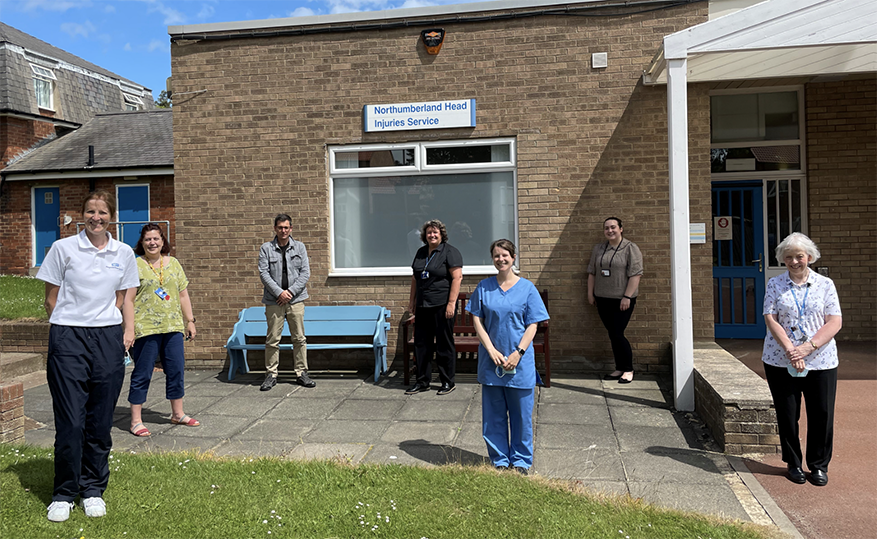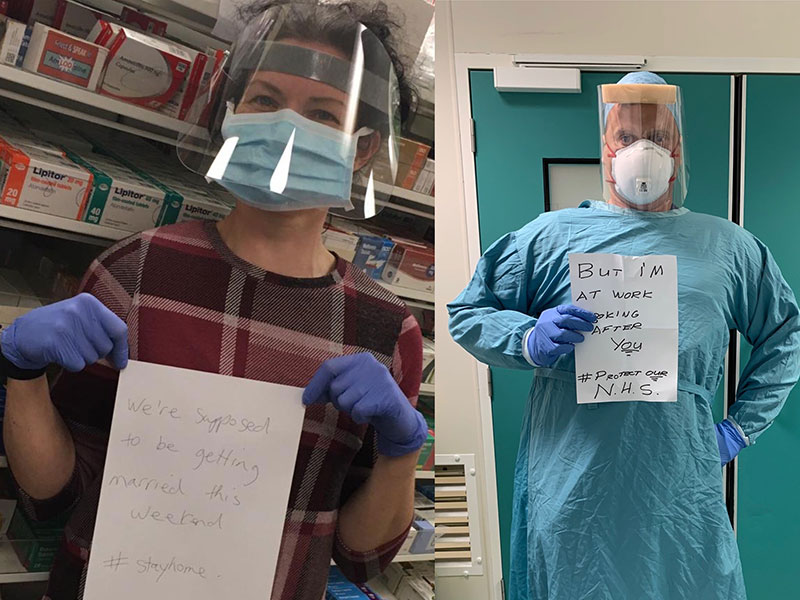14 October is an opportunity to reflect on and celebrate the value that Allied Health Professionals (AHPs) bring to the healthcare workforce.
This blog is written by a multi-professional team of AHPs, and shines a light on the remarkable impact that AHPs have on the delivery of care. We've also set out how the HCPC standards fit into their work.
It looks at the case of one patient, Mr A. The team worked together to treat his initial needs and support him to transition from care home to independent living successfully.

Our team of Allied Health Professionals (AHPs) provides community neuro-rehabilitation to adults following traumatic brain injury. We’re part of a Trust that has several neuro and specialist services, of which we are one.
The team consists of physiotherapists, occupational therapists, speech and language therapists, community practitioners and consultants in rehab medicine and neuro-psychology. We cover a large, sparsely-populated area of England deliver and we deliver high-quality and goal-orientated rehabilitation to clients in their own homes.
Mr A was a patient who had sustained a traumatic brain injury and multiple facial fractures following a fall. He had previously suffered a spontaneous intracranial bleed causing a number of severe physical and cognitive impairments.
During several months in a neuro-rehabilitation centre he made good progress with inpatient rehabilitation, and upon discharge he was able to move short distances, speak clearly and manage a normal diet. However, after just a few weeks back at home, he fell and sustained the traumatic brain injury. After a brief hospital stay he returned home again, but unfortunately his relationship with his partner broke down, and he was placed in a care home many miles from the people he was close to.
Having held a physically active job for most of his life, and with a keen interest in gardening and managing his own allotment, Mr A was a practical man who thrived on social interaction, enjoying time with family and friends in his rural community. Placed in an unsuitable care home with little opportunity to engage in his own interests and see loved ones, his mood plummeted, affecting his engagement in his rehabilitation.
Our team works to keep patients at the centre of discussions about their goals and the support needed to achieve them, and this case was no exception. The discussions included not only Mr A himself but also his family and friends (and later his carers too).
For Mr A, the result of these conversations was working with social services to transfer him to a more suitable care home that was closer to his family.
Getting the right property in the right place, with an appropriate care package, was essential to making Mr A’s transition to independent living a success. Over several months our community practitioners, occupational therapists and physiotherapists worked tirelessly
with the local authority to achieve this, visiting various sites and discussing potential adaptations and access.
The team’s ability to overlap skills and blur traditional professional boundaries was a key part of this, as the rural setting of the work meant that any visits needed to maximise clinical time with Mr A.
Whilst work was going on to find an appropriate property, community rehabilitation was well underway. Mr A received twice-weekly physiotherapy sessions to improve his ability to transfer safely and independently. He was supported to access his local swimming pool where he completed an exercise programme to improve his standing balance and general strength. This was handed over to friends and family who continue to support him in the pool once a week.
During this time, our psychologist worked with him on his mood, which increased his engagement with the therapy provided by us. Occupational therapists worked with Mr A on his personal care, ensuring he could do as much for himself as possible prior to living on his own – for example creating meal plans and practising cooking skills, as he loved to grow food and cook from scratch.
Finally, Mr A moved into his own property with an appropriate care package. With bespoke rehab, he progressed to being independent in most of the daily activities that were important to him: gardening, weeding and building bug huts, planters and bird boxes, all from his wheelchair.
We supported Mr A with training to enable him pass on his wealth of experience and skills in gardening and DIY to a weekly charity group, which hugely impacted his self-esteem and helped to maintain his mental health.
One of the best things about our team is that we are goal-directed and not time-limited. The whole team takes a functional approach so that we can work with our clients and families to really achieve and realise their goals. For Mr A, we were in the right place at the right time to support him to create a new life for himself.
How the HCPC standards fit in
The HCPC's standards of conduct, performance and ethics set out how HCPC registrants must behave and what the public should expect from them.
The AHPs in this team provided an exemplary service to their patient, which met a number of these standards particularly well.
Standard 1: Promote and protect the interests of service users and carers
Treat service users and carers with respect
1.1 You must treat service users and carers as individuals, respecting their privacy and dignity.
1.2 You must work in partnership with service users and carers, involving them, where appropriate, in decisions about the care, treatment or other services to be provided.
1.3 You must empower and enable service users, where appropriate, to play a part in maintaining their own health and wellbeing and support them so they can make informed decisions.
Standard 1 is all about ensuring that registrants promote and protect the needs of service users and carers as a part of their care.
A key part of treating service users with respect is ensuring that their privacy and dignity is upheld. Registrants must work in partnership with service users and carers, which means involving them in decisions about their care and treatment. They are also asked to encourage service users to maintain their own health and wellbeing and support them to make informed decisions.
The care that the team provided included listening to Mr A’s need to be closer to his family and playing a key role in motivating his recovery. They worked closely with his friends and family to develop and rehabilitation programme that they could later support him with. This demonstrated that Mr A and his carers were involved in the decisions that were being made about his care and treatment.
The team also invested in supporting Mr A’s preparation of meal plans, developing his cooking skills and helping him to garden. This was a great way to help Mr A maintain his own health and wellbeing.
Standard 2: Communicate appropriately and effectively
Communicate with service users and carers
2.1 You must be polite and considerate.
2.2 You must listen to service users and carers and take account of their needs and wishes.
2.3 You must give service users and carers the information they want or need, in a way they can understand.
2.4 You must make sure that, where possible, arrangements are made to meet service users’ and carers’ language and communication needs.
Work with colleagues
2.5 You must work in partnership with colleagues, sharing your skills, knowledge and experience where appropriate, for the benefit of service users and carers.
2.6 You must share relevant information, where appropriate, with colleagues involved in the care, treatment or other services provided to a service user.
Standard 2 is all about how registrants communicate with the people around them, including how they communicate with service users and their carers and how they work with colleagues.
When communicating with service users and their carers registrants must be polite and considerate, listen to and take into account their needs and provide them with relevant information as necessary.
The team demonstrate appropriate and effective communication with Mr A and his carers by listening to Mr A’s need to be closer to his family and recognising the key role that they played in motivating his recovery.
Registrants are also expected to work in partnership with their colleagues. This includes sharing skills, knowledge and experience for the benefit of service users and carers, and sharing relevant information with colleagues who are involved in the care, treatment or other services.
The team and their treatment plan for Mr A provide a great example of working in partnership across different professions. The team shared information about Mr A’s needs to social services to support his transfer to a suitable care home. They also worked together to use their different skills and knowledge to improve his mood and self-confidence.
Standard 3: work within the knowledge of your limits and skills
Keep within your scope of practice
3.1 You must only practise in the areas where you have the appropriate knowledge, skills and experience to meet the needs of a service user safely and effectively.
3.2 You must undertake additional training to update your knowledge, skills and experience if you wish to widen your scope of practice.
3.3 You must refer a service user to an appropriate practitioner if the care, treatment or other services they need are beyond your scope of practice. This person must hold the appropriate knowledge, skills and experience to meet the needs of the service user safely and effectively.
This standard is all about making sure that registrants work within their scope of practice, which means having the knowledge and skills to provide the services that they are offering. Where a registrant doesn’t have these, they must refer their service user to another practitioner.
Mr A’s needs were varied. The approach that the team used, where multiple professionals worked with him at the same time to meet those needs, meant that he was fully supported. Each professional within the team used their specific skills and knowledge to meet Mr A’s needs: for example, the occupational therapists helped him prepare meals and the physiotherapists helped him with his mobility.
Where Mr A’s needs were beyond one professional’s scope of practice, we can see that another member of the team, who had the correct scope of practice, began working with him. For example, when Mr A needed help with his mood, this was provided by a psychologist in the team.
Meeting our standards
There's a wealth of support, information and case studies available on our website to help registrants to meet our standards:
Revised standards
Updated versions of the standards of conduct, performance and ethics came into effect on 1 September 2024. If you haven’t already familiarised yourself with them, you can find out what’s changed, browse our support and catch up on our webinars below:


